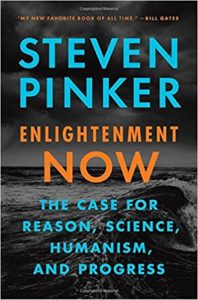
I have not so much read the book as scanned it. For most of the book he builds a case for his basic claim that life, for most people, has improved to an amazing extent in the last 200 years and we can thank science, reason and humanism for all this progress.
I assume he has to provide so much data because he knows this is an unfashionable opinion within the postmodern liberal intellectual elite and this bothers him. By listing all these facts and showing us all these graphs, he thinks he can convince even his most skeptical critics that progress is real, and that it is much more widely distributed than most people imagine. Is there something missing from his account of progress? I think there definitely is. I do not disagree with his claim that progress is real. Hunger, disease, violent death, these are not trivial concerns. The tremendous progress in these areas is real, and it is meaningful. Intellectuals who criticize Pinker by pointing to persistent or new forms of ill health, physical suffering or violence should take a break and actually read the book, they will find that he has the data and it is not bad data. Either argue about his data with better data of your own, or argue on some OTHER grounds. On THESE grounds, he is solid.
But human beings are not just machines for eating and reproducing. Our lives need meaning and just as we are programmed to seek food, sex and shelter, we are also programmed to seek social status and other satisfactions that are not necessarily better delivered to more people today than were delivered to them in older iterations of human society. That many of his critics are wrong about the data, or are straw-manning about science and reason, does not mean all of them are wrong about everything. Yes, Pinker has a powerful point, whatever else you think is important, you cannot deny that food, health and shelter are critically important.. and that they were not delivered by pre-modern societies anywhere close to the levels at which they are delivered to astoundingly large numbers of human beings by modern society. But this still leaves a lot of room for argument about other things (meaning, community, hope, love, family, friendship, power, hate, happiness, the list is endless), argue about those; but if your case is based on some romantic notion of idyllic peasant utopias of the past, then this book should set you right.
So far, so good.
Then you come to the last chapter and Pinker tries his hand at explaining humanism and its philosophical enemies, and boy oh boy, is he bad at it. I agree with him on at least 2 parts of his basic thesis (reason and science have tremendously increased human well being, in ways that most human beings care about very deeply indeed, though not in all ways) and would love to agree with him on humanism too, but cannot. Anyway, that is another story. But even I felt like cutting back to 3 stars or less when I got to his mangling of Nietzsche. My serious suggestion is that you skip the last chapter. You will not lose anything and you may appreciate a lot of the facts in the rest of the book with less prejudice.
Worth a read, especially if you have not read “The better angels of our nature”.. if you have, you can probably skip this one. It is just a more detailed and wider-ranging version of the same book.


I have not read this book but I am a big fan of Steven Pinker–and his former student Ben Shapiro. I love the way both their minds their minds think and how their views evolve based on data, statistics, econometrics.
It has been patently obvious since I was a little kid that free market capitalism would dramatically lower global poverty and dramatically increase material living standards by almost every measurable metric. This indeed has happened.
This demonstrates that claims of “oppression” [where people benefit from the suffering of others], “white supremacy”, “structural racism”, “imperialism” at the global level are mostly nonsense.
Omar, all your points are correct; but I think to even get to your points the post modernists/marxist narrative needs to be contested.
I did get the sense, Omar, that Pinker might not be mediator or spiritualist in the way Russell Brand or Sam Harris are for example. And that as a result there is much that Pinker’s writings do not demonstrate a deep knowledge of. As a result I am not sure Pinker has a deep understanding of faith; or would have a deep understanding of a quotation from the Rig Veda. This is conjecture on my part. Has he had deep spiritual experience?
yes but what about pakistan? 🙂
I am not that good at stats but I do think taleb got the better of pinker. The world is getting better, the world is getting dangerous. Both are true. Also, the enlightenment values of building society on reason has not travelled far from Europe, I see no one looking into this particular argument. Even in India, it is the left that took control. Even traditional India for all its faults allowed freedom of speech with regards to religion. Now laws exist against that. Which is single biggest danger, for you are allowing people to propagate religion without giving people right to debunk it, that only leads to endless tribalism, not bursting of the bubble . The left obstruction on this and even on economic and other issues issues is doing a great deal of danger. Climate change is also a danger with USA being so troublesome. With rise of donald trump we are witnessing a saudi arabia type phenomena as I wrote my article of “Headwings ahead”. Money/power can be put to any use, without putting reason ahead, its all going to be a mess.
[…] finished it yet and wanted to write its review after I had. However, fellow blogger Omar’s excellent review on it precipitated this piece early. This is going to be in 2-3 parts, as the topic is immense and […]